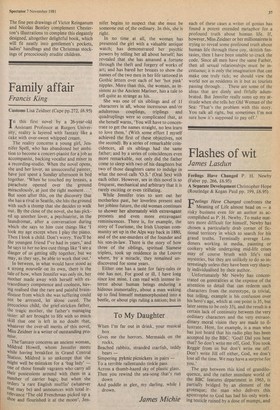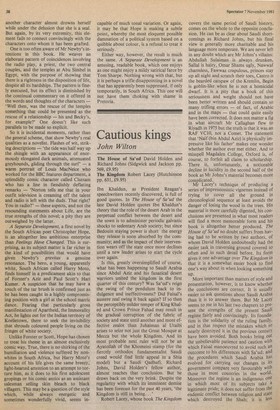Flashes of wit
James Lasdun
Feelings Have Changed P. H. Newby (Faber pp. 266, £6.95) A Separate Development Christopher Hope (Routledge & Kegan Paul pp. 199, £6.95) L'eelings Have Changed confronts the Meaning of Life almost head on — a risky business even for an author as accomplished as P. H. Newby. To make matters more difficult for himself, Newby has chosen a particularly drab corner of fictional territory in which to search for his grand truths. Terminally average Londoners working in media, painting or cookery while undergoing mid-life crises may of course brush with life's real mysteries, but they are unlikely to do so interestingly unless they have been very sharply individualised by their author.
Unfortunately Mr Newby has concentrated on generalities at the expense of the attention to detail that can redeem such characters from the stereotype, (a trivial, but telling, example is his confusion over his hero's age, which at one point is 35, but later seems to be only 33), and the result is a certain lack of continuity between the very ordinary characters and the very extraordinary moral vision they are made to illustrate. Here, for example, is a man who has just heard that his radio play has been accepted by the BBC: 'God! Did you hear that? So don't write me off, God. You took Reggie from us but don't write me off. Don't write Jill off either, God, we don't lose all the time. We may have a surprise for you.'
The gap between this kind of grandiloquence, and the rather mundane world of the BBC features department in 1963, is partially bridged by an element of the grotesque; the man who delivers this apostrophe to God has had his only working testicle ruined by a dose of mumps, and another character almost drowns herself while under the delusion that she is a seal. But again, by its very extremity, this element fails to connect convincingly with the characters onto whom it has been grafted.
One is too often aware of Mr Newby's intentions in this book. He weaves an elaborate pattern of coincidences involving the radio play, a priest, the two central couples, and the temples at Abu Simbel in Egypt, with the purpose of showing that there is a rightness in the disposition of life, despite all its hardships. The pattern is finely executed, but its effect is diminished by the continual commentary on it offered in the words and thoughts of the characters — 'Well then, was the rescue of the temples something that could be presented as the rescue of a relationship — his and Becky's, for example?' One doesn't like such parallels to be made so explicit.
So it is incidental moments, rather than the general scheme, that show Newby's real qualities as a novelist. Flashes of wit, striking descriptions — 'the tide was half way up the shingle with an appearance of enormously elongated dark animals, attenuated greyhounds, gliding through the surf' — a warm portrait of Louis MacNeice who worked for the BBC features department, a splendidly comic character called Clutsam who has a line in fiendishly deflating remarks — 'Norton tells me that in your outfit television is creaming off the talent and radio is left with the duds. That right? You in radio?' — these aspects, and not the resounding statements about Life, are the true strengths of this novel; a pity they are outweighed by the latter.
A Separate Development, a first novel by the South African poet Christopher Hope, is an altogether less ambitious enterprise than Feelings Have Changed. This is surprising, as its subject matter is far richer in the kind of possibilities that would have given Newby's gravitas a genuine resonance. The hero, a young, apparently white, South African called Harry Moto, finds himself in a predicament akin to that of Forster's Aziz and Paul Scott's Hari Kumer. A suspicion that he may have a touch of the tar brush is confirmed just as he has been caught in a highly compromising position with a girl at the school matric dance. Fearing that particularly gross manifestation of Apartheid, the Immorality Act, he lights out for the Indian territory of Koelietown, there to seek the invisibility that shrouds coloured people living on the fringes of white society.
Unlike Forster or Scott, Hope has chosen to treat his theme in an almost exclusively comic way. True, there is no shirking of the humiliation and violence suffered by nonwhites in South Africa, but Harry Moto's account of his life gives the same breezy, light-hearted attention to an attempt to torture him, as it does to his first adolescent gropings or his comic antics as an assistant salesman selling skin bleach to black villagers. This may be a question of the style which, while always energetic and sometimes wonderfully vivid, seems in capable of much tonal variation. Or again, it may be that Hope is making a subtle point, whereby the most eloquent possible damnation of a political system based on a quibble about colour, is a refusal to treat it seriously.
Either way, however, the result is much the same. A Separate Development is an amusing, readable book, which one enjoys as one might enjoy a mildy satirical farce by Tom Sharpe. Nothing wrong with that, but it is perhaps a trifle disappointing in a novel that has apparently been suppressed, if only temporarily, in South Africa. This one will not have them choking with shame in Pretoria.



























































 Previous page
Previous page